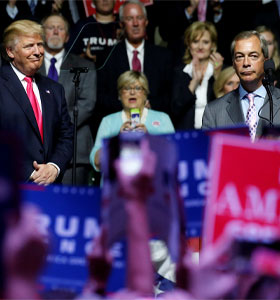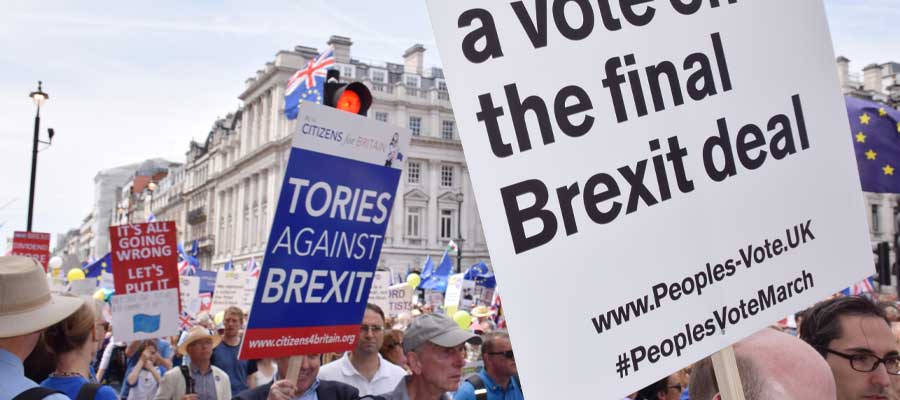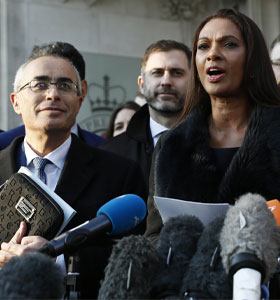Ken Clarke interview - IBA Annual Conference 2018

Ken Clarke has been an MP since 1970, serving as Chancellor, Home Secretary, Education Secretary, Health Secretary and Justice Secretary. He’s now Father of the House of Commons and remains staunchly pro-European. Clarke shares his views on Brexit, the state of democracy and how we got here, with IBA Executive Director Mark Ellis. .
Watch full filmed interview here
Mark Ellis: I want to start with what many would say is a kind of chaos right now with Brexit. I’d like to get your sense of how we got here, facing a real crisis – not only in the UK, not only in Europe, but in a broader sense. Are we too late to reverse it?
Ken Clarke: It’s a huge subject, so I’ll try and give a short answer. There’s a convergence emerging on what the reason is for all the Western democracies on both sides of the Atlantic collapsing in their established form, the reason that they’re all in a terrible crisis, which is that they’re all being rejected by large sections of their population, who are voting angrily against their elite, against their establishment and against their politicians. Britain is just a part of that; you’ve also got Donald Trump, the Italian government and racists being elected into the Danish and Swedish parliaments. It’s all across the Western world.
Why? I’ll try to be very brief (because people are producing whole theses on this now).
I’m part of the 1990s establishment, that’s when I was Finance Minister, that’s when we had greater normality, we had sudden growth with low inflation. We thought we knew how to manage an economy. We were raising living standards and we were eliminating poverty. But, what we failed to appreciate, in all our societies, was that while this was fine for the educated, the ambitious and the successful – people who could take advantage of these prosperous meritocracies – about half of the population were not participating at all. Indeed, they were being, to use the clichéd phrase in England, ‘left behind’ by what they saw as an increasingly wealthy and out-of-touch elite. If you lived in a rust bucket place – either in America or in the United Kingdom, where the foundries have gone and the coal mines have gone – you felt particularly angry.
The government insisted on holding an opinion poll for stupid reasons, and all the people in the rust bucket parts of the UK said “we’ll show the establishment what we think of them
I think the rage that’s being expressed now is a combination of that, plus anti-immigration sentiment. The big surge in immigration in the 2000s, particularly in Europe in 2015, provided a scapegoat for all this. So, in addition to all the politicians – all those people in London, all those people in Washington, all those people in Rome – you had all these foreigners coming here, and that has run through Western democracy.
We must not abandon economically liberal, socially liberal views. I’m a believer in free markets – free markets with a social conscience. However, we’ve have to make sure we address the questions: how far do we make it fairer in the way it distributes its rewards? How do we get more of the population to perceive that it benefits them? How far do we stop the disgraceful and outrageous excesses and abuses of the market system that we saw in the banking sector in the 2000s? You see plenty of abuses in boardrooms and large companies throughout the world, where people receive vast incomes, regardless of whether they’re successful or not, and they live a lifestyle increasingly remote from that of people who have to read about them in the newspapers and work for them for quite a modest and rather stagnant income.
That’s as short as I can make it. But it’s a big subject. Meanwhile, all the traditional parties, all the traditional politicians, are crashing in the polls. They’re not receiving votes and Brexit was just one form of angry protest. The government insisted on holding an opinion poll for stupid reasons, and all the people in the rust bucket parts of the UK said, ‘We’ll now stick our fingers in the eye of all the political parties and we’ll show the establishment what we think of them.’
ME: Evidence suggests immigration generally is good for economies. It was good for the UK and it has been good for the European Union. However, this issue of disinformation, false information – fake news as President Trump would call it – and interference from third parties into the Brexit campaign, seems to have played a very important role. It seems to have created a real sense of disinformation. I came across a quote from Aaron Banks, a prominent Leave campaigner. He said, ‘The strategy was to ignore facts. Facts do not work. And that’s it.’ The whole campaign was premised on this idea of spreading disinformation. Isn’t that sufficient reason to say: ‘Let’s take a step back. We should do this again, and do it differently’?
The fiscal position of Britain will be damaged however we leave the EU. The NHS is not going to get any extra money at all
KC: It is. The Leave campaigners didn’t start the immigration feeling, that was fact. It is there and mainstream politicians exploited it. The case you made – that we all benefit from immigration – hardly any mainstream politicians say that because it upsets people. I think British society has hugely benefited by immigration and I much prefer the multicultural, multiracial and multi-varied society I now live in compared to the dreary, rather backward and limited society I was brought up in. I can say that at the IBA. I do say it occasionally – because I’m old and reckless – on platforms in England, but no other mainstream politician would do that and fringe politicians pander to the anti-immigrant feeling.
Immigrants are scapegoats: you tell the Americans ‘it’s all the Mexicans’; you tell the British ‘it’s all the Muslims’; you tell the French ‘it’s all the Arabs’ – ‘get rid of them and all will be better’. That gets you an awful lot of votes. Fake news came into that.
Now Aaron Banks, who’s a strange financier, produced from somewhere vast sums of money for the Leave campaign. He took this ‘negative publicity works, nevermind the facts’ attitude. The two big things they ran were that they’d stop paying money to Brussels and that would produce millions of pounds a week for the National Health Service – £350m a year. It was a bizarre figure and totally untrue. The fiscal position of Britain will be damaged however we leave the EU. The NHS is not going to receive any extra money at all. They knew this.

Nigel Farage speaks during a Republican presidential nominee Donald Trump campaign rally in Jackson, Mississippi, United States, 24 August 2016. REUTERS/Carlo Allegri.
The other thing the Leave campaign ran was that 70 million Turkish people were going to come and take our jobs and molest our womenfolk if we didn’t leave the EU. That was run on a huge scale. They chose the Turkish like Nigel Farage had done when he campaigned with brown people on all his posters, because they knew that white EU citizens from Germany and Romania and Poland weren’t all that unpopular. They wanted some Muslim people, so they claimed 70 million Turkish people were going to come and that had to be headed off by our leaving the EU.
That’s just negative campaigning, but these were mainstream politicians doing it. Michael Gove ran the Turkish story pretty big. Then you have, on top of that, fake news and so on, but that’s because we simply do not regulate social media. We do somewhat regulate the mainstream media to stop it. But people have cottoned on to the fact that if you are going to exploit fringe subjects, you might as well invent your own fringe subjects that, with the help of people who’ve targeted your audience, will arouse the feelings of people you’ve identified.
That’s another part of the acute crisis in traditional, two-party politics: the centre-right versus the centre-left. I have been familiar with it for most of my career and it has dominated most of the Western world, but many of the parties are now in ruins. Republicans and Democrats are weird, polarised shadows of what they used to be. Christian Democrats and Social Democrats across Western Europe are being ousted by people who use fake news and exploit simplistic prejudices.
ME: Of course it’s not just fake news internal to the UK or any other country – we’re seeing the phenomena of fake news coming from outside and Third States that are involved with this as well.
KC: The Russians in a big way.
ME: Russia particularly. Does that change the paradigm or do we just simply have to accept that it’s the reality that we live in right now and it’s going to continue?
KC: I accept it’s a very bad thing and I approve of the way we’re trying to shame the Russians into cutting it back. I don’t think the Russians are very good at it. All the arguments I’ve lost, I’d like to be able to blame the Russians and say ‘I would have won that vote but for this Russian interference’ – that’s what the Democrats are trying to argue in the US. The Russians are pretty incompetent and they’re not very good at Western democratic debate, so I’m afraid I don’t think they’ve made any real difference to our Brexit result, although I’m sure they tried.

Anti-Brexit demonstration, 23 June 2018, London, UK. Campaign for a People’s Vote on the final Brexit deal.
Anything that breaks up the EU is attractive to the Russian leadership, but it was an underlying factor. We can’t just blame the Russians and say we would otherwise have carried on quite happily. We were facing this surge of popular discontent among a large spectrum of the older, less educated, less successful, embittered population, which the Russians – among many – tried to exploit. And I suppose they aim at the young rather than the old through social media, but you’ve got to be pretty naive to take it at face value. I watch Russian state television and it is extremely biased. You’ve got to be a bit of an idiot not to realise it is rather biased and I don’t think it’s perverting me and I don’t think it’s the root of all the problems we’re having in Western democracies.
ME: We have no idea where this Brexit path is going to end. Do you think this is going to come to a very hard exit for the UK or do you think there will have to be a compromise?
KC: Anybody who tells you that they know what is going to happen in British politics over the next month is deceiving themselves. We are in the middle of a mad, anarchic situation – just as every other Western democracy – where events are no longer very predictable. Every expert ‘knew’ that Donald Trump couldn’t win the American presidency. No one had heard of Emmanuel Macron unless they followed French politics closely. Nobody could imagine he was going to win a presidency in the last six months. Every expert ‘knew’ the British were going to vote to remain in the EU, and all the events since we voted have been totally predictable.
The ordinary rules of conventional politics cannot be applied to the last two-and-a-half, three years of Brexit politics in Britain
I hope that we get an agreement. I’m a lifelong supporter of the European project, a lifelong supporter of Britain being a leading member of the EU – sadly now, realistically, to minimise the damage of having an agreement that does the least harm to our political standing in the world and to our economy. But I just don’t know, because at every stage – every major event that’s affected British domestic politics, or even the plans they had for how Salzburg was going to be handled as a summit – it all goes wrong. I think the establishment’s plan is to secure a reasonable withdrawal agreement and then a long transition period. Whether they’ll succeed, I couldn’t even begin to guess, because the political events of the next week in Parliament could go completely mad. We are on a voyage of discovery at every stage. The ordinary rules of conventional politics cannot be applied to the last two-and-a-half, three years of Brexit politics in Britain.
ME: Does that mean that peace in Northern Ireland is at risk?
KC: I don’t think so. Presumably, as in most political debate, both sides exaggerate. So the idea that if we don’t have an open border the Irish Republican Army will be back in business tomorrow is greatly exaggerated, but it would destabilise the political set up in Ireland. The great thing about Ireland is the Good Friday Agreement, which was an historic step. That is a solemn treaty involving the British, the Irish and the Americans, which brought to an end several hundred years of violence – particularly the last 40 years of very acute violence. The idea to just break it because it is inconvenient and nobody’s thought of it is rather reckless. Violence has not died out in Northern Ireland, there’s still fringe Republican violence.
What would certainly happen is that Northern Ireland Roman Catholic/Republican anger would be aroused if the Good Friday Agreement was broken and a fixed border put in. In Irish politics, for centuries, symbolism has mattered and the symbolism of putting the buildings back and having the queues, having the paperwork, having the delay at the border – a divided Ireland again with a physical barrier – would be a great recruiting moment for extreme Republicanism.
It would also damage our economy, on both sides of the Irish border, very substantially. It would damage the relationships we have with the Republic of Ireland, which are the best they’ve been since the Republic was created. Relations with the Republic of Ireland and the UK, particularly now the Republic has modernised itself so spectacularly since it joined the EU, are quite amazing. Embittering and making difficult those relations would be crazy. That’s one thing Theresa May is very sound on. It’s very difficult to detect what strong views our Prime Minister has on any particular aspect. Either she doesn’t have strong views or she’s very diplomatic and keeps them concealed, but she’s pretty strong on the Irish border.

Gina Miller speaks outside the Supreme Court following the decision of a court ruling that Theresa May’s government requires parliamentary approval to start the process of leaving the European Union, in Parliament Square, London, UK, 24 January 2017. REUTERS/Toby Melville
So the big thing between now and Christmas is to complete this withdrawal agreement.
We’ve settled the money, we’ve settled the rights of citizens already either side of the channel: Britons in Europe, the Europeans in Britain. We have to settle the open border in Ireland and May remains emphatic that we’re not having physical barriers. It’s not just the violence we risk, it is destabilising the political settlement in Ireland, it is breaking solemn treaty obligations.
The Russians tried, but they’re pretty incompetent and they’re not very good at Western democratic debate, so I’m afraid I don’t think they’ve made any real difference to our Brexit result
It’s an essential precondition to returning to a sane world that we have an open border as the basis upon which we’re withdrawing in March. That is complicating everything, because none of the Brexiteers thought of Ireland. Nobody in England has ever followed Irish politics. It baffles the Brits; we can’t understand all these bizarre sectarian Protestants and Catholics arguing with each other, which is a million miles removed from the politics of Great Britain. At the time of the referendum, this opinion poll, when we were all ordered to leave, Ireland wasn’t mentioned. It was a mystery to some of the leading politicians on the Brexit side that they now had to consider what to do about the Irish border – if they were really talking about leaving the Single Market and the Customs Union – and actually it remains a mystery. Many people just wish it would go away as a problem, but it’s quite important and it’s the big short-term thing. Everything else has got to go into the long grass for an indeterminate transition period where nothing changes and we eventually have a space in which grown-up, sensible politicians, diplomats and civil servants on both sides of the channel can start serious negotiations about what our future trading and political positions are going to be.
